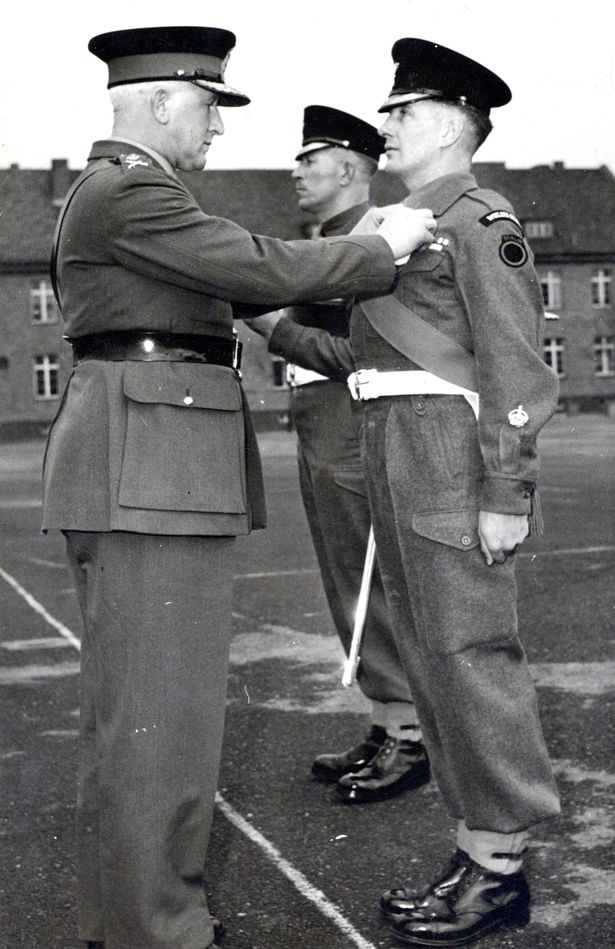JOYCE, Austin P (#190)

#149
Major Austin P ‘Bobby’ JOYCE MBE MM BEM
British Army
Alan Pollock’s Rough Notes:
A work in progress – the fuller biographies will emerge in due course: please sign up to the Newsletter (bottom of the page) and we’ll let you know when we’ve done more justice in writing up our extraordinary signatories.
Welsh Guards Regimental Quartermaster, Sergeant Major Korean War, 16yr old Irish Yorkshireman: Troopship seaman & June, 1944 began fighting at Caen.
“In a remarkable career – spanning active service in Normandy in 1944 to Northern Ireland in the 1970s, the whole with the Welsh Guards – he first came to prominence for his M.M.-winning deeds in March 1945, deeds that reached a wider audience on the front and back pages of The Victor some 30 years later: the comic’s colourful depiction of his gallant actions included a scene of him lobbing a grenade into a Spandau position – “Share that with your mates, Fritz” Whether he shared such sentiments with Rudolph Hess remains unknown, but he commanded the former Nazi leader’s ‘Old Guard’ at Spandau Prison in the early 50s, a far cry from his subsequent duties in South Arabia and Northern Ireland.”
“Austin Peter Joyce was born at Wakefield, Yorkshire in November 1923 and originally enlisted in the West Yorkshire Regiment in March 1942…transferring to the Welsh Guards in October 1943. Posted to the 1st Battalion – and the subject of rapid promotion – he came ashore as a 19-year-old N.C.O. at Normandy in June 1944. Here, then, the commencement of his part in the Battalion’s hard-fought contribution to the campaign in North-West Europe, in which he was advanced to Company Sergeant-Major and won his M.M. He returned to the U.K. in late March 1945 and was embarked for Palestine at the year’s end, where he served until April 1948 (Medal & clasp). Having then been awarded the B.E.M. for his valuable services in Japan – in support of the operations in Korea – in the period September 1950 to June 1952, he served in Germany in the following year, with command of the ‘Old Guard’ to Rudolf Hess at Spandau Prison. Active service resumed with a tour in South Arabia in the period 1956-60 (Medal & clasp) and he was commissioned Lieutenant (Q.M.) in May 1963. Of his subsequent part in the Northern Ireland operations little is known (clasp), but he attained the rank of Major (Q.M.) and was awarded the M.B.E. for his valuable service to the Guards Depot at Pirbright. Having been sent his M.M. and B.E.M., Joyce finally enjoyed the experience of an investiture at Buckingham Palace on 7 November 1973.” [Spink’s catalogue of a sale including his medals, duly acquired by the Welsh Guards Charity]
“Welsh Guards, formerly Regimental Quartermaster Sergeant Major during Korean War, an Irish son brought up in Yorkshire & eldest of 9, for the wide, weighty service of the Guards Regiments in general and here, the Welsh Guards in particular, throughout so many campaigns and hard-won battle honours in both world wars. Bob earned a Pacific Star as a 16yr old boy Merchant Marine seaman on the “Capetown Castle” Troopship in 1941, taking troops to Singapore and India and bringing New Zealanders and Canadians over to Liverpool – trying for the Irish Guards without vacancies in Leeds, he joined the West Yorkshire (70th = Boys Battalion) then into East Yorks, transferring trained into the Welsh Guards, eventually going into France in mid-June,1944 beginning his fighting just outside Caen.” [ARP]
“In a remarkable career spanning active service in Normandy in 1944 to Northern Ireland in the 1970s, the citation for the award of an immediate Military Medal (MM) in 1945 and published in the London Gazette on 12 July 1945 sums him up and reads:
‘Lance Sergeant Joyce was in command of the leading section of No. 7 Platoon, the left forward platoon during a Company/Squadron attack on the village of Bonninghardt on 7 March 1945. During the attack his section came under fire from a Spandau dug-in by the side of a farmhouse and another opened up from the house itself, directed at No. 8 Platoon on his right flank.
Lance Sergeant Joyce, realising he was caught in the open, dashed forward with his section and got them under cover close up by the house. His quickness in appreciating the situation, and his determined action in carrying on, caused the enemy gunner to withdraw behind the house. He then single-handed ran across to the house, leaving his section to give him covering fire, and got up to the window where the Spandau was firing, enfilading the platoon to the right. He got up under the window and shot the enemy firer and, after hurling a grenade through the window, he dashed back and brought up his section to consolidate the area of the house.
His action enabled the platoon to seize the farm and surrounding buildings, capturing 26 Germans from 22 Para Regiment and enabling his platoon to carry on with the attack in which they consolidated on their objective. The speed, resourcefulness and determination of Lance-Sergeant Joyce’s action undoubtedly saved the Company many casualties and largely contributed to the success of the attack.’
Lance Sergeant Joyce’s actions, as depicted in the Victor comic of 8th July 1972:

Source: Welsh Guards Charity


